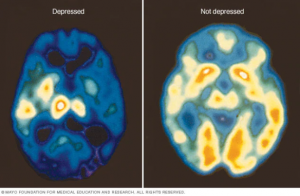Depression (major depressive disorder) is a common and serious medical illness that negatively affects how you feel, the way you think, and how you act. Depression causes feelings of sadness and/or a loss of interest in activities once enjoyed. It can lead to a variety of emotional and physical problems and can decrease a person’s ability to function at work and at home (American Psychiatric Association, 2013). Seasonal Affective Disorder is a type of depression that affects people during specific seasons such as winter when there is less daylight. Postpartum depression affects mothers after giving birth, usually brought on by biological and emotional changes.
What Causes Depression?
Depression is caused by a combination of factors also known as nurture and nature, that increases individuals vulnerability to develop a depressive disorder. Depression can be the result of genetic factors and depression in family history or a chemical imbalance in the brain. A history of trauma increases the likelihood of experiencing depression. Women are twice as likely to experience depression which may be hormone-related. Depression can follow a significant life change such as loss, divorce, or stress. There are many causes of depression and often it is a combination of reasons that may have resulted in mental illness.
What are the Symptoms of Depression?
- Sleeping a lot more or less than usual
- Having gained or lost weight unintentionally
- Overwhelming feelings of sadness, grief, or lack of worth
- Lost interest in the pleasures of life, as well as work, family, and friends
- Preoccupation with perceived failures or personal inadequacies
- A lost desire for sex
- Isolation and avoidance behaviours
- Highly agitated, sluggish or inert
- Absence of feelings
- Reducing self-care such as personal grooming and eating
- Increased use of alcohol or drugs (prescription or non-prescription)
- Having difficulties concentrating or making decisions
- Suicidal thoughts of self-harm
Myths About Depression

Have you ever had anyone tell you “it’s all in your head” or “just get over it”? Brain scans tell us that depression changes the brain. It is more than something you “need to get over” or “happy up”. The appropriate intervention carried out over a period of time can reverse these brain changes and restore a person’s emotional balance.
How Can You Treat Depression?
You do not have to struggle with this on your own. There are a variety of medical services, professionals, and options that can help treat depression. Research suggests a combination of therapies may provide the best option. Psychiatrists, psychologists, and counsellors are specifically trained to help with depression. Common treatments include:
- Cognitive Behaviour Therapy (CBT): helps individuals understand the relationship between mood, thoughts, and behaviours and teaches problem-solving skills
- Interpersonal Therapy: can teach positive interaction skills with other people
- Medication: such as antidepressants, mood stabilizers, and sometimes medications for psychosis and anxiety can be used to treat or manage symptoms of depression
- Light Therapy: is said to help those with SAD by sitting or working next to a light therapy box that mimics natural outdoor light. It is thought to affect brain chemicals linked to mood and sleep
- Self-Management: a tactic individuals can do on their own to manage depression. Exercising daily, eating a well-balanced and nutritious diet, maintaining a stable sleep schedule, managing stress, spending time with loved ones, and monitoring substance usage. Spending time in the sun and taking supplements like iron and vitamin D can also help
What Can I Do to Help Myself Get Better?
 To support your recovery, you need to support your treatment. It takes time to get better, which means consistency and patience must be practiced. Develop a trusting and well-communicated relationship with your doctor or therapist. Take your medication as prescribed.
To support your recovery, you need to support your treatment. It takes time to get better, which means consistency and patience must be practiced. Develop a trusting and well-communicated relationship with your doctor or therapist. Take your medication as prescribed.
You must also take care of yourself. Surround yourself with people that promote a positive environment and lifestyle. Having people who care about you in your life will give you the extra support needed.
Breaking down tasks into smaller pieces, journaling, and keeping up will daily tasks and grooming will all help ease stress and negative thoughts. Let go of things that are not critical.
Celebrate the small victories. Be kind to yourself.
Sources:
American Psychiatric Association. Diagnostic and Statistical Manual of Mental Disorders (DSM-5), Fifth edition. 2013
